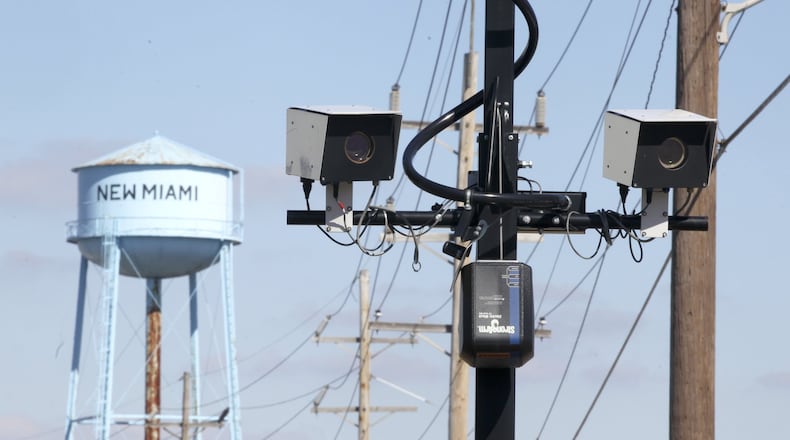“Ohio law is now overwhelmingly contrary to the position taken in the 2014 decision and entry. The due process challenges and the ordinances of the cities of Dayton, Trotwood and West Carrollton are similar or essentially identical to those in the present matter,” attorney James Englert wrote. “Because Ohio appellate courts and federal district courts, especially those post-2014 rulings, offer no support for the grant of summary judgment, New Miami asks that the court reconsider and vacate the prior grant of summary judgment.”
RELATED: Ohio Supreme Court stalls New Miami speed camera case
Retired Judge Michael Sage granted “summary judgment” or essentially found the speeders had a valid case challenging the constitutionality of the speed cameras in 2014, eight months after the class action lawsuit was filed. After Oster took over the bench in 2015, he confirmed Sage’s decision. Since then, Oster and the judges on the 12th District Court of Appeals have declined the village’s requests to take notice of at least one court decision against the city of Toledo, which supported speed camera program processes.
"As plaintiff correctly points out in their opposition to defendant's motion, the court contemplated the facts of the Walker case within its March 11, 2014 decision, yet found they did not alter the court's decision in this case," Oster wrote, concurring with Sage's due process concerns.
The judge gave the speeders another major win last year when he ruled New Miami must repay speeders every penny of the $3 million it collected from drivers who were caught by the old standalone speed cameras. The village only pocketed about $1.8 million as the rest went to the third-party vendor that managed the program.
The village wants Oster to re-think that decision as well because Englert said in his motions there is case law that says only money in the defendant’s possession can be repaid as restitution and “only $1.8 million can be traced to particular funds that the village ever possessed. That should be the amount of the judgment issued against New Miami.”
For the first time in the protracted case the village has put on the record with Oster a request that if it is found they must repay speeders, they want ten years to satisfy the debt. One of the speeders’ attorneys Josh Engel said the 12th District Court of Appeals had already answered that question when it said the statute regarding sovereign immunity doesn’t apply in this case.
He said the entirety of New Miami’s latest motion is basically a repeat.
“These are all issues that have been considered and rejected, sometimes multiple times, by Judge Oster and the Court of Appeals,” Engel said. “I do not know why they are continuing to try to re-litigate issues that have been decided.”
Engel said since there won’t be time for them to fully brief this latest filing he doesn’t believe these issues can be discussed with Oster next week. What will be on the table is his motion asking the court to appoint a financial watchdog, to make sure the village doesn’t squander money that should be set aside to pay the eventual judgment.
They have asked to subpoena records from the accounting firm that did the village’s audit for the state in conjunction with the watchdog request.
“We are trying to figure out what they have done to prepare for the inevitable judgment that’s going to be entered against them,” Engel said. “Good business and good fiscal practice is if you know you’re going to owe some money in the future, you start to put that money aside. Here they have not done so.”
MORE: New Miami speeders want financial watchdog appointed
The speeders want the village to set aside money it is now collecting under a new speed camera program — that comports with new state laws — instituted in early 2016, that employs the use of hand-held speed cameras. At any given time a patrol vehicle, with an officer aiming the camera, can be seen tucked in between buildings on the main drag just at the point where the speed limit drops coming out of Hamilton to 35 mph, past the bridge on U.S. 127.
The village’s share of the virtually automatic $95 ticket under the new program is 65 percent, or $61.75. As of June, the village had collected $783,969 from the speed cameras. The village has racked up $309,592 in legal fees defending this case, a bill taxpayers are footing because insurance doesn’t cover this type of litigation.
Englert could not be reached for comment regarding his latest court filing.
New Miami Speed Camera Litigation Timeline
July 2013: A class of speeders sue New Miami over stationary speed cameras, claiming they are owed $1.8 million.
March 2014: Now retired Judge Michael Sage declares village speed catchers unconstitutional.
April 2014: Sage certifies the case as a class action, a decision later upheld by the appeals court.
February 2015: Newly appointed Judge Michael Oster confirms camera program unconstitutional.
January 2016: New Miami employs a new hand-held speed camera program.
May 2016: New Miami appeals class certification issue to Ohio Supreme Court, an attempt that later fails.
November 2016: Settlement talks go nowhere and the two sides later wrangle over garnishment, pre-judgment interest, attorneys fees and other issues speeders raise.
February 2017: Oster says New Miami is on the hook for the full $3 million speeders are owed.
May 2017: New Miami appeals Oster's ruling and claims sovereign immunity, the court accepts immunity appeal but said appeal of the $3 million is premature because there is no final judgment yet.
January 2018: 12th District Court of Appeals says no immunity for the village.
June 2018: The Ohio Supreme Court denies jurisdiction by a 4-3 vote.
June 2018: Speeders ask Oster to appoint a financial watchdog.
About the Author
